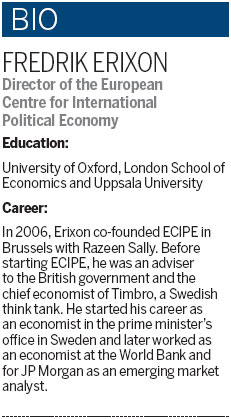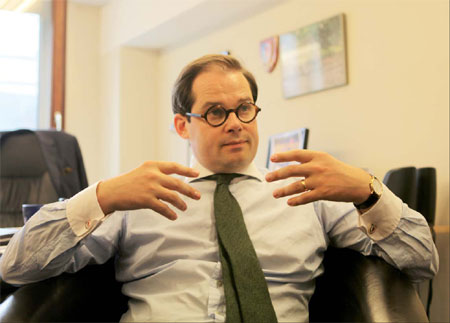Greater role to play on world stage
Updated: 2013-09-13 10:19
By Fu Jing (China Daily)
|
|||||||||||
China should be more assertive in its global role, says think tank founder
Fredrik Erixon urges Chinese leaders to have a greater voice and influence in international organizations.
"Though the old powers are reluctant, China deserves global roles in line with its rising economic clout, and Chinese leaders should have the determination to realize this in the coming years," says Erixon, a Swedish writer and economist, at his Brussels office, which is within walking distance of the headquarters of Europe's major institutions.
Erixon got his first job as adviser to the Swedish prime minister at age 23. In 2006, he founded the European Centre for International Political Economy, now one of the most influential think tanks and lobbying groups from among more than 1,000 surrounding the EU headquarters.
Much of its research interests in recent years have centered on China, due to its economic growth. In the spring, it organized a debate on China's role in the international system.
Erixon expects China's new leadership to send more encouraging signals and intentions in November, when the Central Committee of the Communist Party of China makes significant decisions on the new agenda for reform to further invigorate social and economic development.
He believes they will also focus on strategies and actions for extending the country's global influence.
"November is a good time for the world to see what the leadership focuses on, not only in economic reforms but also its external strategy," he says, claiming Chinese leaders have not revealed enough about how they intend to change long-term policies.
"As China has become bigger and bigger in the world economy, it should formulate foreign policy which responds to its economic needs and economic interests," says Erixon. "We don't see it at present, but it will be more obvious in the coming 10 to 20 years."
Erixon believes China's non-interventionist foreign policy is going to change by exerting more influence in international organizations such as the United Nations, the International Monetary Fund, the World Bank and the World Trade Organization.
"The world is getting complicated, and China will find its own ways to communicate on how to use these organizations and connect its own strategic and economic and foreign policies to a broader global agenda," he says.
That means the older powers would lose rights, he adds, and they should accept the reality that they need to play a lesser role. For example, within the IMF, China and Italy at present share roughly the same voting rights.
"So in the coming 10 years, what kind of leadership China should play and offer for other countries is a big issue," Erixon says.
He recognizes that the Chinese leadership has invested much time and energy in diplomacy to help other countries understand China's intentions and policies.
The meeting between Xi Jinping and Barack Obama in the US after Xi became president was one of the "active dialogues" proposed by China, Erixon says.
In spite of active communication and dialogue, he says it is not easy for the older powers to accept losing influence in global governance.
"No, they will not naturally accept the new powers at the table," Erixon says. "But do you want a China with a developing country's mentality, keeping a low profile and tied down by transitional policy, or do you want a China whose international leadership will reflect its economic position?
"I don't think many European countries have come up with an answer to that question."
Erixon says it is normal that a growing power like China is going to bring changes to the existing practice and system, and the established powers will react in positive and negative ways.
"But I think Chinese, US and European leaders should think about how we want to change the international system, to reflect not only the changes in China but also the changes around the world in the past 30 years," he says.
He thinks the changes are harder for Europe to accept than other powers.
First, it is more difficult for Europe to understand any government in the world in terms of strategic national interests - something the European Union is trying to play down among its member nations to heighten cooperation.
In order to maintain peace and prosperity in Europe, a country should back away from strict interpretations of national interest.

"That leads to endless debate about political issues," says Erixon. "I think this is the first problem. Other countries, especially China, now do not meet a Europe that is prepared to have a solid, rational consideration about power and prosperity."
The US understands the language of power in a different way to Europe, he says.
Second, when looking at international organizations, they are post-World War II institutions created to manage Europe.
"Europe always thinks these institutions belong to us," he says, but now they are challenged by the change in the world's economy, which should be reflected in the way the institutions are managed.
"The problem is they cannot let go of the ideas. These institutions were created to solve our problems, and now we have to create institutions to solve others' problems as well. That's where we are."
He says it is interesting that the IMF has changed the quotas of voting rights and the share of resources, but European governments are being defensive and don't want to give away power. At the same time, Europeans travel to Beijing asking for investment and help to bail out struggling sectors and companies.
"This is what Europe understands, that the world has changed but they are not prepared for it," Erixon says.
China's determination is important in facing these difficulties, Erixon says.
China is developing its own story and it must have its own political narrative of what it wants these institutions for, he says. And if it doesn't have those ideas, it is difficult for other countries to let China become a new global leader.
He says a good strategy for China is to spend less time thinking about what other countries think, and about what these institutions want from China; it needs to take decisive action, starting with trade and currency.
While designing and implementing its own domestic agenda, China should have dialogue with the WTO and the IMF in the coming years.
fujing@chinadaily.com.cn
|
China should have more dialogue with international institutions such as the WTO and the IMF, says Swedish economist Fredrik Erixon. Fu Jing / China Daily |
(China Daily European Weekly 09/13/2013 page32)
Today's Top News
List of approved GM food clarified
ID checks for express deliveries in Guangdong
Govt to expand elderly care
University asks freshmen to sign suicide disclaimer
Tibet gears up for new climbing season
Media asked to promote Sino-Indian ties
Shots fired at Washington Navy Yard
Minimum growth rate set at 7%
Hot Topics
Lunar probe , China growth forecasts, Emission rules get tougher, China seen through 'colored lens', International board,
Editor's Picks

|

|

|

|

|

|






